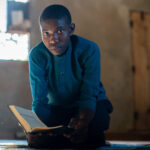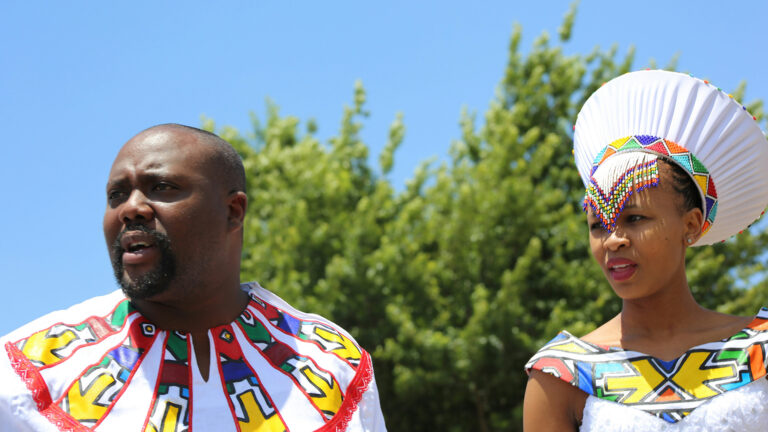Samuel looked at his wife holding their newborn son. As a young man living in the city, Samuel was thankful for his close friends in the church. But he missed the village where he grew up. As he thought about parenting, he remembered the physical and emotional closeness he had shared with his large extended family and the protection he received in his early life. Now he asked himself, “How can I help my wife and children to feel that we are a close family, protected, and safe—here in this city?”
How should a family raise children in today’s modern culture?
Parenting In The City
Samuel and his young family are like millions of African parents who find themselves far from home, faced with the challenges of city life and removed from the old assurances of the large extended family. They want to remain true to the roots that make them Christian and African. Their question is: How should a family raise children in today’s modern culture?
When living in their community, parents could call upon their own parents for advice, help, and continuity. A well known entrepreneur and marketer is quoted as remembering that her grandmother modelled and taught her the “virtues of love and hard work, integrity, and an irrepressible sense of humour. She showed me how to maintain my dignity”. For parents like Samuel and his wife, who do not have family around them, here are a few bits of advice on godly parenting.
Pass On Traditions, Values & Rituals
Parenting is a link between the generations past and those of the future. Children are God’s gifts to us. Christians in Africa have a double belonging: first to God, and then to our people group and community. Parents stress this belonging through all stages of growth, enshrined in rituals of birth, child naming, rites of passage, courtship, marriage, and other life celebrations.
However, we must be careful to distinguish which traditional rituals can enrich our understanding and obedience of God and which are contrary to our Christian beliefs.
Christians in Africa have a double belonging: first to God, and then to our people group and community.
In the midst of great change and globalisation of values, such rituals provide continuity, stability, shared identity, and collective experiences. By honouring our traditions, parents can offer their children the resources for finding identity and resiliency. Traditions help us hold the past, present, and future together.
Build On Your Traditions
Authentic Christian parents build on traditions where children are trained to honour God as creator, respect older people as mother or father, acknowledge age mates as brothers and sisters, treat younger ones as siblings, and care for strangers as fellow humans. Although children are brought up to belong to a specific community, they also have individual responsibility and should be held accountable for what they do.
Encourage your children to own their ethnic identity and yet belong to an ethnically diverse community of shared faith.
A common community in which people of different ethnicities find belonging is the church. It is a joy to see ethnic diversity expressed within a community where parents can encourage their children to own their ethnic identity and yet belong to an ethnically diverse community of shared faith.
Stay With Your Children
A young man says, “As a child, I seldom saw my parents. Both my father and mother had jobs. So our family had money, but we had very little time together. I felt like I did not really know them, and they did not know me. Throughout primary school, other children did homework with parents. But Dad paid tutors to help us. Whether we children were in boarding school or staying at home, we all felt that we did not really know our father and mother. Our hearts felt empty. Both Dad and Mum never realised that money does not solve every problem. We just needed Dad and Mum to spend time with us”
Young children should not be away from parents at the age when they need love and teaching most.
In Africa today there are perhaps too many boarding schools. While good education is a priority, young children should not be away from parents at the age when they need love and teaching most. The result of such separation is overemphasis on academics and less emphasis on discipline, patience, morality, self-confidence, and other values that are foundational to character building. Such qualities are gained in an atmosphere of love, stability, and modelling. That can only happen in a home where parents are consistently present with their children.
As much as possible, children should live in the same home with their parents. Someone has said that values are “caught” not taught, meaning children learn best when they are near their parents.
Praise Your Children
All children need praise. A mother arrived home and found that her 14-year-old daughter had cleaned the house, washed the clothes, and started dinner. She praised her daughter by saying, “Ruth, you did so well. You cleaned the house, washed the dirty clothes, and even started dinner. Thank you. Now we can all eat early”.
All children need praise.
Ruth was so happy to realise that her unselfish work touched the lives of all the family members. As a young person, she also learned: “I must praise people who do kind actions for me”.
Help Your Children Turn To Jesus
Some people say, “Do not tell a child, ‘You should become a Christian’. Instead, let each child choose whether he wants to be a Christian, or go some other way”.
But God says, “You must commit yourselves wholeheartedly to these commands that I am giving you today. Repeat them again and again to your children. Talk about them when you are at home and when you are on the road, when you are going to bed and when you are getting up” (Deuteronomy 6:6-7).
A child who receives little or no teaching will feel an empty hole in his heart. He may try to fill that hole with all kinds of evil.
Children need Bible teaching. A child who receives little or no teaching will feel an empty hole in his heart. And he may try to fill that hole with all kinds of evil. A Christian parent should take every opportunity to teach the Bible often to all young people in the home.
Be An Example
No matter what you tell your children, they will imitate your actions. For instance, if they see you doing corrupt things, they will follow in your footsteps. Never tell yourself, “I must engage in this shady practice so that I will get money to help my children”. Money from corruption will never bless your children.
No matter what you tell your children, they will imitate your actions.
As a parent, you can help your children by being an example of diligence and hard work. Then teach your children that money earned honestly will bring blessings to the family, but a person who gets money through corruption will reap trouble.
Today there are youth and young adults who refuse to work. In some cases, their parents failed to model and encourage diligent work at home. If you have a child who will not work, take steps to show him that laziness brings poverty (Proverbs 6:9-11).
Parenting Means Protecting Your Children
Parenting is an assignment from the Creator himself in which he gives us the job of protecting children until they are mature. Such protection begins before a baby is born.
If a girl or woman drinks alcohol while she is pregnant, the baby may be born with brain damage. Even if she stopped drinking after learning she was pregnant, she may find her baby’s brain was damaged by alcohol even before she realised she was pregnant. It is therefore wise for any girl or woman who is likely to conceive not to drink any beer or other alcohol.
God gives us the job of protecting children until they are mature.
A critical area in which children need protection is that of pornography. Many children use the internet and other electronic media to look at pornographic images and watch sex acts. The pornography they see on such devices can lead them into sexual sin and many kinds of evil. As a parent, you must know what your child is watching, and you must take steps to protect them from looking at pornography.
God says, “Run from sexual sin! No other sin so clearly affects the body as this one does. For sexual immorality is a sin against your own body… You do not belong to yourself, for God bought you with a high price. So you must honour God with your body” (1 Corinthians 6:18-20).
Parents who really love their children will guide them on how to live.
Most young people want boundaries, even though they will push against whatever limits are set. Young people want rules that clearly show them what they should do and what they must not do. Parents who really love their children will guide them on how to live. Parents who do not guide their children are saying with their actions, “I do not care about you. You can become as bad as you want.” That is not the kind of parents we want to be.
The Importance of Fathers
Today some fathers in Africa do not stay at home with their wife and children. They choose to stay in the town where they work. Some stay in a girlfriend’s flat or in the local disco. Such men come home only to change clothes, eat a meal, and demand sex from their wife. That kind of father is not satisfactory for Africa where we hope to compete with the rest of the world.
Africa can become a world leader, but that will be possible only if our fathers see how important it is to stay with their wife and children and show love to them.
Being a good father means spending time helping your child to grow into a responsible adult.
A wife says, “Our children were so angry when their father left home. They felt, ‘Dad left home because he no longer loves us’. But I promised God that I will never leave our children. And I pray that through me, they will realise that our heavenly Father has not left us”.
The Marks of A Good Father
Africa does have many very good fathers. Being a father is more than making a woman pregnant. Being a good father means spending time helping your child to grow into a responsible adult. A good father listens and talks to his wife and children instead of sitting in front of a television. Only then can a man claim to be a real father.
A Responsible Provider
Such a father invests money wisely and builds the family home. He works so that the family will have food for another season. He talks with his children about how to handle money, how to make and keep friends, how to respect the opposite sex, how to walk and live as people of honour, how to avoid the ways of bad friends, and how to work diligently at home and at school.
Committed to Quality Time
Each family should eat together at least one meal each day, turning off the television and other distractions, and talking freely with one another. This time together should be relaxed and enjoyable. It is also a time for them to tell how wonderful it is to walk with Jesus.
Modelling Godly Marriage
Africa today needs more fathers who are present in the home and love their wife and children, who pay school fees on time, care for their children, and take time to ask them about their joys and troubles. Such fathers will help their sons to realise, “After I marry, I must not forget the promises I made on my wedding day. I must not be a womaniser who lives a life full of adultery. I must not get drunk. Rather, I must be a father who takes responsibility for my wife and children. Together my wife and I must show our children how to be faithful Christians and good parents”.
Africa today needs more fathers who are present in the home and love their wife and children.
Fathers and mothers must both encourage their sons and daughters to remain virgins until the day they marry. Remember, only people who are not adulterous themselves can tell young people, “Do not have sex outside marriage”. Sex outside of marriage breaks the very foundations of marriage and family.
Young people want to see adults who are examples of obeying God’s law that tells us: Sex is only for a husband and his wife (1 Corinthians 6:18-20; 7:3).
Understand Shared Responsibility
Christian parenting sometimes goes beyond just our own family and children. Following the Rwandan genocide, Grandmother Sara adopted 26 children, all less than 17 years old. When a trauma counsellor visited her three years after the genocide, the widow was living in a small house with all her little ones. “These are my children,” Grandmother said. She also explained the help she and others like her had received.
For example, a women’s trauma healing group became a safe place for her. The women in the group helped her train the girls for adulthood and asked Christian men in the community to mentor the boys. Her church provided a place of worship and training in Christian living. Grandmother Sara and the other adults in her devastated community showed that the God of hope can use our resources to rebuild a traumatised community through shared Christian parenting.
The God of hope can use our resources to rebuild a traumatised community through shared Christian parenting.
Every child has a right to a family and home, but what happens to those who have lost both due to tragic circumstances, such as war or HIV/AIDS? How do we parent those who are on the streets as orphans and homeless? God calls the local church to model networking, community connectivity, and caring so that these little ones are not denied the basic need for parenting.
The Essence of Christ-Centred Parenting
This is the essence of Christ-centred parenting: to practise parenting that transcends our own family and children. We must undertake the training of a generation that will follow after God’s heart and who can, in turn, pass on godly values to the next generation.
Jesus Christ is our guide for parenting. He is present among us in every situation, penetrating our culture, transforming us from within, and giving us new meaning and purpose. Our cultures may change and evolve, but Jesus Christ does not. His word comes down into our values—not to destroy them but to transform them for his own purposes, helping us to develop a biblical African style of parenting to pass from one generation to the next.
Godly Parenting: Points To Remember
- Trust in God as your partner in parenting. God is Immanuel, present with us. He desires to be actively involved to guide and encourage us as we bring up our children.
- Pass along Christian standards, African values, and family rituals. God has given us precious values for child training. In most places in Africa, parenting goes beyond one’s own children to involve the children of the neighbour and others growing up in the community. A collective approach to parenting through the church, community, and family can help build godly children and keep our African identity strong.
- Value your children. Children are made in God’s image. As his image-bearers, they have inherent value and worth, which parents have the divine obligation to protect. Left alone to grow without correction and discipline, the child will make unfortunate choices that will lead to pain and sorrow. Parents should strike a balance between allowing children to be children and training them to become responsible adults.
- Honour God. God deserves awe, respect, and honour from his children. In an age when so many people swear and curse with their mouths and live impure lives, are you training your children to honour God with their language, heart, and actions?
- Celebrate your children. Mark each of your children’s milestones with events they can remember as they grow up: birthdays, confirmation ceremonies, rites of passage, graduations, thanksgiving, and many more. These create memories that enrich their lives and help to chart their progress.

The Africa Study Bible app is available on the Tecarta Bible App, the world’s best study Bible app, which is available to download on Google Play Store and Apple App Store.
Contact Oasis Regional Directors to order your Africa Study Bible:
- Regional Director East Africa: WhatsApp: +27 79 572 4877
- Regional Director West Africa: WhatsApp +234 809 111 1184














